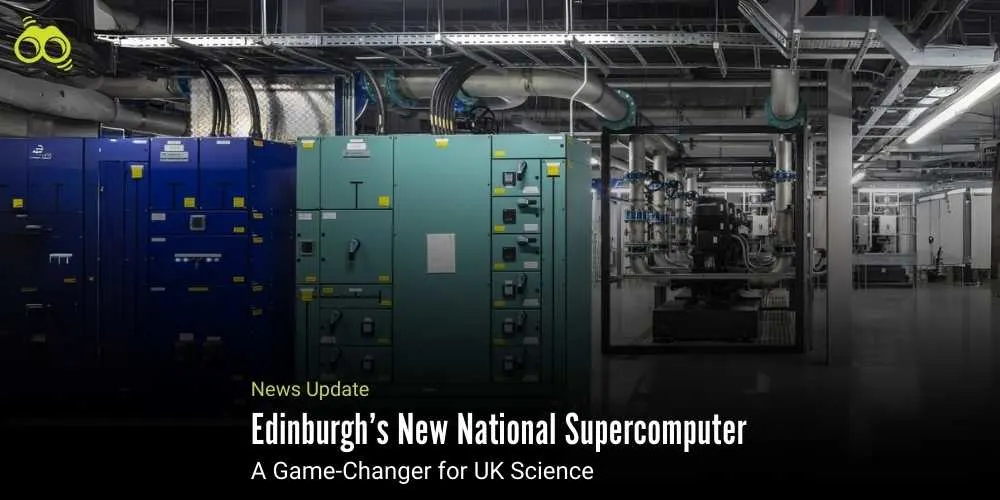A 10-Year Strategy for UK Science: Edinburgh’s Supercomputer Signals Long-Term Vision
University of Edinburgh to Host New National Supercomputing Centre
Founded in 1583, Edinburgh University is one of the most distinguished universities in Scotland, UK, and a leading force in global higher education. Renowned for its role in the Scottish Enlightenment, it remains at the forefront of science and technology, driving major contributions to human knowledge, such as the discovery of the Higgs boson and the development of IVF. Today, with over 40,000 students and a strong international reputation, it is consistently ranked among the world’s artificial intelligence universities and is widely regarded as one of the most innovative research institutions in Europe. Against this rich legacy, Professor Mark Parsons, Director of EPCC and Dean of Research Computing at the University, has underlined the strategic importance of the UK Government’s decision to invest in a new national supercomputer in Edinburgh. He noted that, as the Government seeks to implement its Industrial Strategy to promote economic growth, prosperity, and societal well-being, safeguarding the UK’s competitiveness in research and science is more critical than ever. Parsons explained that supercomputers play a pivotal role in advancing knowledge across multiple domains, comparing them to telescopes for astronomers. From drug discovery to climate modelling and aeronautical engineering, they provide capabilities that conventional methods cannot achieve.
He emphasised that while artificial intelligence research had attracted growing attention, traditional supercomputing remained indispensable for research scientists. He highlighted that universities depend on these resources for independent academic endeavours and collaborations with prominent businesses like Rolls-Royce and public sector entities such as the UK Met Office. Parsons cautioned against assuming that AI could fully replace supercomputers. While AI could mimic some results from complex models, it could not simulate new behaviours without accurate, physically grounded data. He observed that even in areas such as weather forecasting, where AI has shown real promise in short-term predictions,physics-based simulations remained essential for re-parameterisation. He reiterated that data science and artificial intelligence must complement, rather than substitute, traditional modelling and simulation.
The Government’s June 2025 Spending Review proved decisive. Parsons recalled that, after concerns in 2024 about whether funding would continue once the ARCHER2 service ended in 2026, the Chancellor’s announcement of up to £750 million for a new supercomputer was both reassuring and transformative. He attributed this breakthrough to sustained dialogue between EPCC, the government university sector, and the Department for Science, Innovation and Technology (DSIT). The effort, he explained, had involved not only academic stakeholders but also key figures from industry and major public research and science institutions. Shortly after the investment was confirmed, DSIT formally recognised EPCC as the UK’s first National Supercomputing Centre.
Parsons revealed that planning for the new system, known as the ‘Next National Supercomputer,’ is already underway with DSIT and UK Research and Innovation (UKRI). He clarified that the funding package includes not only the supercomputer itself but also the electricity required to operate it, the final phases of data centre infrastructure, and the staff needed for its operation. He expressed confidence that the new system would be globally competitive, ensuring that UK researchers and higher education institutions retain access to world-class computational resources. He also explained that, unlike previous national services funded as discrete five-year projects, the new approach would be based on a 10-year rolling strategy. This shift, he suggested, would reduce delays and help maintain the UK’s edge in science innovation on the international stage.
Parsons stressed that the relevance of supercomputing extends far beyond academia. Without it, he said, mobile phones would be less advanced, aircraft engines less efficient, vehicles less safe, and new medicines harder to develop. Supercomputers, he argued, underpin much of modern life, enabling discoveries that shape industries, healthcare, and even our ability to understand the universe itself. Looking to the future, he confirmed that EPCC intends to adopt the next generation of processor technologies for the new service, expected to be available in early 2027, with a formal launch planned for the summer of that year. This development, he suggested, would mark another major milestone for Scotland universities and reaffirm Edinburgh’s position as a leader in global research and science.
Editor’s Note
The University of Edinburgh has once again confirmed its place at the heart of British and global research. The government’s decision to invest £750 million in a new national supercomputer, to be hosted at EPCC, is not just welcome, it is essential. Without such infrastructure, the UK risked falling behind in global science and innovation. Supercomputers remain the backbone of modern research. They model complex systems, from drug development to climate change and aeronautical engineering, in ways that no other tool can. It's a misconception to think that Artificial Intelligence will render these systems obsolete. On the contrary, AI relies on precise, physics-based data, which is generated by supercomputers. While it can replicate some results and assist with predictions, it cannot simulate new behaviours or provide the fundamental modelling on which science relies. Far from replacing supercomputing, AI must work alongside it. This initiative is therefore more than a matter of prestige. It is about ensuring the UK’s competitiveness in research and safeguarding its ability to make breakthroughs that improve daily life, from safer cars and efficient aircraft engines to advanced medicines and climate resilience. The designation of EPCC as the UK’s first National Supercomputing Centre also signals a new maturity in policy, with a 10-year rolling strategy offering the continuity that past, piecemeal funding cycles lacked.
According to Skoobuzz, the supercomputer due in 2027 will be a defining investment. It will not only cement Edinburgh’s reputation among leading universities in Scotland and the world but also stand as proof of Britain’s determination to remain at the frontier of science and technology.














0 Comments (Please Login To Continue)